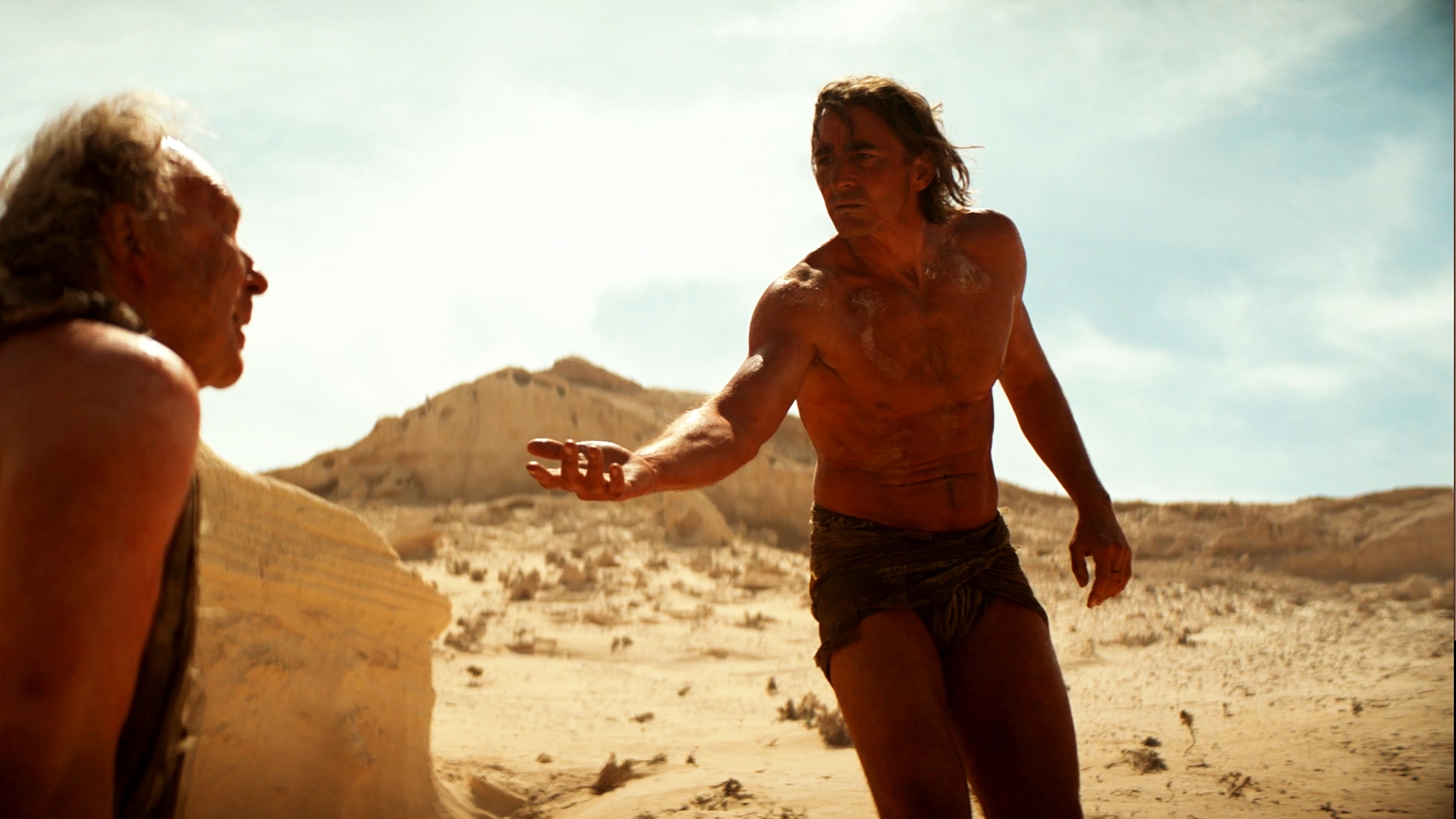Eight episodes in, and I’m still enjoying the show that I’m watching that isn’t actually Foundation. The first episode laid out a very clear and compelling thesis: 1. There is a mathematical formula demonstrating civilization is about to end, and 2. There is another formula that can be implemented to blunt the worst of it. But ever since then, Psychohistory has become nearly an afterthought, a loose thematic structure on which to hang all the elements in which the show is more interested.
Fortunately for me, what the show is interested in is a lot of what I’m interested in, too—revenge, hero journeys, ghost ships, robots discovering their humanity, weird esoteric rules for ancient ship flight, art deco-accented production design, latent psychic powers, and space warriors who use bows. Most all of these elements are taken from the books in some capacity, but so magnified and expanded upon that the original conceit is all but lost.
The show’s themes all feel hopelessly muddled at this point. What does it want to say about the tension between the individual and the society? Or about the intersection between faith and science? We may be at the beginning of the end for the galactic empire, but the view of the show is so myopic, you’d never know it if the pre-programmed ghost of a dead mathematician didn’t periodically show up to remind you. And I don’t have faith that the show is going to resolve any of that with the remaining two episodes. This is not a dumb show by any means. But it is wildly unfocused for such a pedigree project.
But if you can’t have a book-accurate clinical rumination of the fall of the Roman Empire extrapolated to a galactic scale, you most certainly can get a mostly naked Lee Pace walking around in a Robert Smithson installation. Brother Day now has to make good on his promise to endure the pilgrimage to the Mother’s Womb, a vision-bestowing salt cave at the center of a concentric spiral. In doing so, he hopes to silence the dissent against his humanity led by Zephyr Halima. He has his personal shield taken, and the nanobots extracted from his blood before joining the crowd of unwashed masses beginning on their shared journey.
Apparently fewer than half the pilgrims survive the ordeal and despite Day’s physical perfection, he’s been well-insulated from adversity for his entire life. Along the path, he strikes up conversation with another traveler. He speaks of his life working on a planet designated for manufacture of goods too toxic to make on Trantor. The nature of those items being relatively low-tech -ceramics and textiles, instead of say, spaceship engines- was a nice detail that added a humanistic dimension to the anecdote.
At one point, this pilgrim helps Day up when he stumbles, and Day, in return lays his body in repose when the man can no longer move on. It’s meant to hint that by exposing Day to the humanity he rules over at its most open and fragile, he may experience the spiritual awakening the path is supposed to induce. It’s not to be, of course. The Empire has been a cold-blooded bastard for 400 years, and it’s going to take more than one afternoon to change that. Upon returning to the temple, Day fabricates a vision that the Zephyr choose to interpret as proof of his living soul, and just to ensure his victory is absolute, he sends Demerzel to murder his rival.
Demerzel and Halima’s exchange sets a false note for the ambitious priestess’ character. In the previous episodes, Halima was an aggressive opponent, loudly and unequivocally staking her claim as a voice in opposition to the Empire. Here, in defeat, she strikes a gentle humility at odds with her established behavior. She humbly posits that she believes her new way of thinking is possibly what frightened Day without any acknowledgment that she knew exactly what she was doing by baiting the legitimacy of The Empire.
Still, Halima’s position isn’t the focus here. Rather, it’s Dermezel, who is suffering a crisis of faith and conscience by being ordered by Day to commit this murder. She agonizes against her intractable duty and comes close to admitting her hatred for this man, or this iteration of a man, she has long served. That she should have experienced a vision in the cave where Day did not is meant to be a damning indictment of Day’s spiritual paucity. What that means in a show that has treated religion with cynicism is a question that may be explored, but again, unlikely.
Back on the Invictus, Salvor continues to struggle with finding a way to stop Phara from crashing the ship into Trantor. We are given a brief flashback to Phara’s childhood, and the day Imperial ships rained devastation on her planet and killing her brother. It is frightening and sad, but whatever sympathy it builds for her character is immediately stripped away as it’s reinforced the other casualty of the war is Phara’s humanity. She doesn’t care who she hurts in retaliation, just so long as they hurt worse than her.
Salvor is able to maneuver herself and the last surviving captive onto the bridge, where they hope to prevent the ship from jumping wild again. They learn that jump travel was very different 700 years ago. Pilots were hard-wired into the ship itself and had to utilize an arcane method of knowledge and willpower to shape the ship’s destination. Traveling this way was more akin to “making a wish” than anything more conventional. It’s a neat bit of flavor, and one of the few occasional strange details that make this feel like a place over 10,000 years in the future. Indeed, Hugo was not dead and successfully managed to navigate to the comm center to contact his home planet. But neither the arriving Thespins, nor Phara’s interference are enough to delay the ship from making its proscribed jump, and in the blink of a collapsing star, the ship disappears.
Hari and Gaal’s interactions are the least satisfying of the episode. The big reveal is that Hari had begun a second Foundation on his home planet, using Terminus as a decoy to draw Imperial attention. Gaal asks for further details, but Hari resists, telling her only that she needs to go and be involved. Gaal bristles at this and declares she’s done with Hari’s secret game of chess. Either he tells her everything, or let her leave. Or she’ll allow the ship to overheat and explode.
In the end, Hari acquiesces and allows Gaal to hop back into the life pod. She sets her destination for a planet that will take 130 years to reach. While Gaal’s aboard the ship provided knowledge of her psychic ability and the second foundation, it’s a clumsy interlude. Gaal’s been a passive character this season, a receptacle for all the exposition and world-building the show requires. This is all building up to her to being a more active participant in future events, but it’s a bit of a drag to watch now. Will we see her anymore this season? Will she truly sleep for over a hundred years, just to awaken for the next phase of The Plan? Or will she be prematurely revived as her pod rams into the side of a giant, ancient space-hopping warship? Two episodes left to find out!
Stray Observations
- I understand Foundation isn’t a hard science kind of show, but with all of the fuss made about Gaal’s ship constantly venting excess heat just to keep it from exploding, it seems absolutely reckless to hop into a small, unprotected life pod in the middle of a violent asteroid field. Gaal’s faith in that tiny tube to carry her safely for a century and a half is greater than any faith or science displayed on this show.
- I wonder if the Thespin ships attacking the Invictus will survive the jump intact? It would be neat to see everyone whole and ready to keep scrapping when the ship arrives at its next location.
- Also, the ship design and jump process was very cool. Having the tiny black hole formed in the center as the rest of the ship was pulled inward was a neat effect.
- That was pretty grisly the way the Anacreon soldier was pinned to the hull breach and had his guts sucked out into space. Not as grisly as, say, the climax of Alien: Resurrection, but still. Yikes.
- I liked the artful heap of skulls leading up to the Maiden’s Womb. Made it look like the mouth of a dragon’s lair from an early ’80s RPG magazine cover.
- The sense of horror Day showed as his ship prepared to return to Tantor suggests Dermezel’s accusation cut deeper than he let on. Perhaps this insidious wound will also grow and fester.

